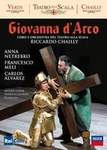|
Back
07/27/2018
Giuseppe Verdi: Giovanna d’Arco
Anna Netrebko (Giovanna), Francesco Meli (Carlo VII), Carlos Alvarez (Giacomo), Dmitry Beloselkiy (Talbot), Michele Mauro (Delil), Chorus and Orchestra of Teatro alla Scala, Bruno Casoni (chorus master), Riccardo Chailly (conductor), Moshe Leiser and Patrice Caurier (directors), Christian Fenouillat (set designer), Agostino Cavalca (costume designer), Christophe Forey (lighting designer), Etienne Guiol (video designer), Leah Hausman (movement director), Patrizia Carmine (TV director)
Recorded at Teatro alla Scala, Milan, Italy (December 2015) – 136’
1 Blu-ray disc Decca 074 3967 – LPCM Stereo – Picture format 16:9 – Region 0 – Booklet in English – Subtitles in Italian, English, French and German

   
Watching this is a confounding experience. It simply never comes together.
The curtain rises on a black-and-white film showing a sombre, present-day scene with a (dying?) woman lying in a bed - the final act of La traviata perhaps? But then the screen rises to reveal the same scene, now in colour, and I think that what transpires is a woman’s delirious last moments imagining she is Joan of Arc.
This opera is rarely staged partly due to the abruptness of its scenes and the fact that the plot, instead of attempting to recount the amazing chronicle of Joan of Arc, lapses into triteness with the French king falling in love with Joan, and her father accusing her of witchcraft. After harrowing reversals, she dies gloriously of her battle wounds.
The singing is very fine, but everything has a detached quality. The king is an effigy; he is encased in golden armour, his face is painted gold, and at one point he is seated on a golden horse. Francesco Meli is vocally ideal for the role, but it is hard to accept him as a human character (which is probably the point).
Joan (or the Madwoman) gets dressed in golden armour as well. Anna Netrebko’s fans will like her (as they should), but she is forced to maintain a rapt focus on her visions or whatever. There is a “What am I doing here?” quality to the performance.
The father lurks within the unit set and comes forward to sing when his part demands it. Carlos Alvarez demonstrates once again he is one of the great baritones of the day. The role is most noted as foreshadowing the truly glorious Verdian baritone roles to come, instead of being cherished for itself. In the brief role of the English knight, Talbot, Dmitry Beloselskiy displays a fine bass with at least one line looking ahead decades to the Messa da Requiem. The finest thing in the score is the buzzing, ominous overture, one of Verdi’s best.
Also not helpful are the subtitles that can disappear for lengthy periods. The camera work frequently gives the effect of a tilted stage, sometimes to the right, other times to the left. Perhaps La Scala doesn’t have the numerous camera placements of other major theatres.
Jesus Christ, complete with stigmata and bearing his cross, makes an appearance. Is this what directors do when they have absolutely given up? More to the point, though, they're also some striking projected images of medieval warfare. The booklet contains an unconvincing argument that Giovanna d’Arco isn’t such a terrible opera after all. I would love to be convinced. This production doesn’t do it.
At least Riccardo Chailly leads a committed musical performance, as one would expect with the musical forces of La Scala (and for the season opener at that.) The chorus rejoices in the full range from demonic to angelic.
I suspect this recording is better enjoyed in audio-only format.
Michael Johnson
|